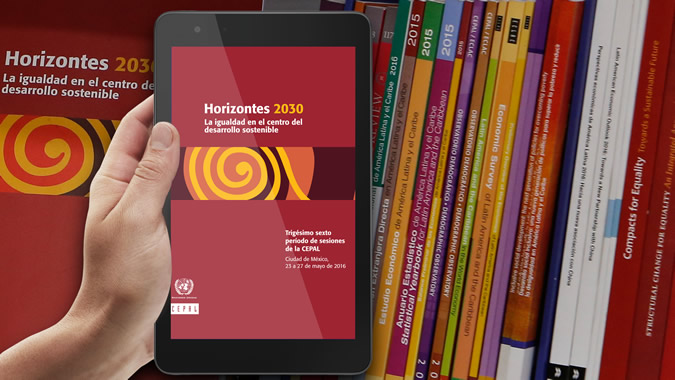ECLAC Updates its Digital Repository and Modernizes its Electronic Outreach
As of today, easier downloads of the United Nations Regional Commission’s documents.

The Economic Commission for Latin America and the Caribbean (ECLAC) continues strengthening its electronic outreach platform to expand access to its vast academic assets among the Member States and the population in general. Its two main electronic communications tools —the www.cepal.org website and the Digital Repository— are now more tightly integrated and their capacity has been expanded, offering easier navigation and access to and downloads of the Commission’s publications and official documents.
An updated version of the Digital Repository —which houses more than 37,000 documents published by ECLAC on a wide range of topics related to the region’s development from 1948 to date— was launched today. The archive covers some 8,000 authors, 120 collections and five different languages for a total of more than 2.5 million pages of historical and up-to-date information.
The new Digital Repository offers improvements in its design, download formats and search engines. Texts are available now not only in PDF, but also in TXT, RDF, XML and CSV formats, allowing the development of applications and interoperability with other repositories through data harvesting.
Similarly, the main ECLAC website, developed using the Drupal content manager, has also been completely overhauled to improve the user navigation experience. It offers access to the Commission’s different institutional contents —publications, news, event announcements, training courses and research guides— as well as to essential information organized by work areas and topics.
The new site’s main characteristic from the information organization perspective is that it is structured into taxonomies and fields. As a result, connections between contents are simple, topics can be highlighted, and navigation is more flexible, offering users different options at all times and abiding by the guidelines of accessibility, web positioning and mobile-friendly design.
The website has raised the profile of several products, such as the publications catalogue, ebooks in epub and mobi formats, applications for mobile devices available from Google Play and the App Store, and subscriptions. It currently has 47,000 registered users who regularly receive targeted information from the Commission on topics of interest to them.
Since the website and Digital Repository were integrated in November 2014, the two systems have served more than 1.5 million document downloads a year. Traffic statistics report close to 5.5 million unique visitors from 209 countries and territories around the world.
“As part of its open-access policy, ECLAC has expanded and improved its electronic outreach platform, thereby bolstering its interactions with users and reducing the economic and environmental costs associated with the use of paper,” said Alicia Bárcena, the Regional Commission’s Executive Secretary.
The Press Centre offers a wide variety of information products, such as announcements, news items, press releases, infographics, speeches, photographs and audiovisual clips, including the recently launched ECLAC Horizons programme. The ECLAC Live section provides internet coverage of the main events held in Santiago and in other countries of the region.
Access is also available to the Commission’s official accounts on the most popular social networks (Facebook, Twitter, YouTube, Google+ and Flickr), which publish information about the leading topics on the regional agenda in English, Spanish and Portuguese.
On Facebook, ECLAC also has specific accounts for publications, training courses and the Caribbean subregion, while the Library also has a presence on Twitter. In addition, the Commission’s official publications are available through on-line services such as ISSUU and Yumpu.
The modernization process undertaken in recent years includes the recent revamping of CEPALSTAT, a website that organizes, publishes and documents statistical information on the region’s main economic, social and environmental indicators produced by the countries’ official agencies and by ECLAC and other international agencies.
Another product that stores information of relevance to the countries is the Digital Planning Repository, developed by ECLAC to facilitate the consultation and analysis of national programmes by the planning and academic communities and by the general public.
The Regional Commission also has four observatories through which, in partnership with other institutions, it monitors such topics as gender equality, fiscal policy, trading relations between Latin America and the Asia-Pacific region and progress with broadband roll-out.
More information on:
Related content

CEPAL lanza repositorio digital con más de 35.000 publicaciones de acceso libre
El patrimonio intelectual de este organismo de las Naciones Unidas está disponible desde hoy en el sitio http://repositorio.cepal.org.
Related link(s)
Country(ies)
- Latin America and the Caribbean
Contact
Public Information Unit
- prensa@cepal.org
- (56 2) 2210 2040